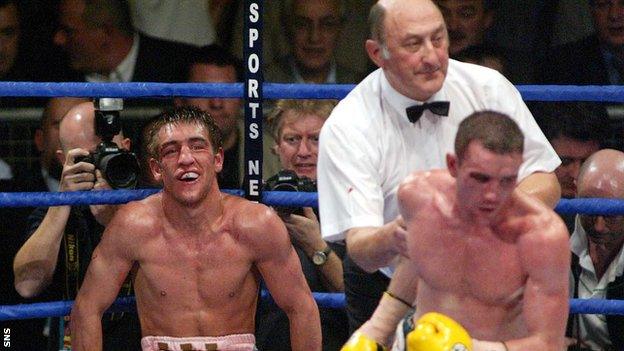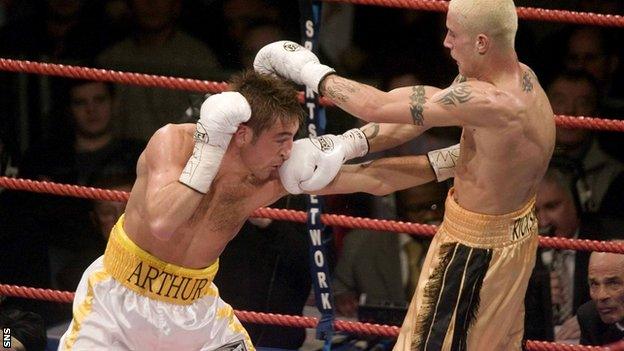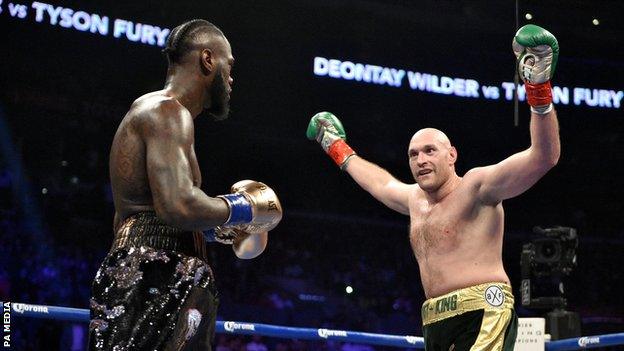Sporting Nation: 'Without boxing, what am I?' - Alex Arthur on post-career struggles
- Published
Throughout July, BBC Scotland's Sporting Nation series is reflecting on some of the greatest feats and personalities from Scottish sporting history. Here Edinburgh boxer Alex Arthur looks back on a career that brought him Commonwealth Games gold and a world title, his struggles after boxing and how he rediscovered his love for the sport.
Alex Arthur reflects on his boxing gold at the 1998 Commonwealth Games in Kuala Lumpur
"I would sit on the sofa, eat and drink crap all day. I did that for months on end. People were getting concerned for me, my mental state wasn't great. I wasn't really engaging with my kids. It was just awful."
In few sports are the lights brighter, the hype more intoxicating, than championship boxing. For the small number who sample those nights at the pinnacle of the sport, adjusting to the mundanity of post-boxing life can be tough.
It's a struggle Alex Arthur is familiar with, having hung up the gloves in 2013 after a memorable career in which he captured Commonwealth gold for Scotland and a world super-featherweight title.
"I was a bit like a regimented soldier, doing the same thing every single day for 20 or so years. Suddenly none of that was there any more, the structure was gone and I didn't know how to cope with that," says Arthur, 41.
"I started to question my whole life - without boxing, what am I? I really thought that boxing defined me, the only thing that was worth living for. I let myself go, I got quite fat. I put on around 30kg in six months and got quite depressed as well.
"But I gave myself a shake, got back in shape. I'm surrounded by great people and slowly I came back to boxing. Little Machlan played a big part in that."
'My personality seemed to switch'
Machlan, 13, is the youngest of Arthur's three sons. He already has his heart set on emulating his dad and becoming a world champion. His passion for the sport dragged Arthur back to the boxing gyms he had been avoiding since retirement.
Mike Tyson once said his biggest fear for his own son in pursuing a fighting career is that he would run into someone like his younger self - desperate and vicious. Arthur understands, but has a slightly different take.
"I had a reputation when I was a boy boxing in Edinburgh as a horrible wee guy. I was a lovely boy outside the ring, nasty in it. My personality seemed to switch. That would be my concern for my son but for the fact that Machlan has that trait as well. He's another one that doesn't take any prisoners.
"Disappointment undoubtedly will come for him at some stage, every fighter in history has faced it. It's how you face that as a man. I can share my experiences with him, but there's nothing I can do to help with how he processes his own disappointments. That's entirely up to him.
"I saw something early on with Ricky Burns, I saw it with Josh Taylor. And if Machlan wasn't my son and I was watching him from the outside, I'd be saying the same about him even at this young age."
Alex Jnr, 18, is also progressing under his father's tutelage and recently won a national title in the 75kg weight class. Liston, 15, trains a little, though his goal is to go to university rather than follow the family path into the ring.
'When dad went to prison, I went to boxing'
Arthur's interest in boxing was sparked by his own father's love of the game, the boy woken in the middle of the night to join his dad to watch big world title fights from the US.
"I would be asking so many questions and he would make me jam sandwiches to shut me up so he could get some peace to watch the fight," Arthur recalls.
When it came time for the young Arthur to take up the sport, his dad was dead against it. In 1988 his father was jailed for attempted murder, and Arthur took solace in the gym. "When he went to prison, I went to boxing."
Idolising "superheroes" like Tyson and Barry McGuigan, Arthur read boxing books voraciously to find out what made these men "so awesome". He took to boxing naturally, and after winning a national championship at age 12, was convinced his destiny was to become a world champion.
That dream was realised in 2008 when Arthur was promoted from interim world title-holder to WBO super-featherweight champion when Joan Guzman vacated the belt. He takes pride in doing it "the old fashioned way", progressing through the ranks and capturing international, British and Commonwealth belts before his crack at world titles.
And yet it's his gold at the 1998 Commonwealth Games in Kuala Lumpur that stands out as his personal career highlight. In the sweltering heat - the air conditioning in the Shal Alam arena was mysteriously broken - Arthur came through five fights to capture the gold and cement his reputation as one of the top amateur boxers on the planet.
"It was the culmination of a really long, tough amateur career. I had put a lot of pressure on myself prior to the competition by telling people that I was going to win the gold medal. I had to keep up my end of the bargain.
"It was euphoric, an amazing experience. Back then there was some stuff going on with Team GB and Scottish boxers weren't getting selected, so to win it for Scotland was just fantastic."
'I was playing PlayStation instead of training'

Losing his British super-lightweight title in a brutal defeat by Michael Gomez proved a blessing in disguise for Arthur
An eighth-round stoppage of fellow Scot Willie Limond in 2003 is considered by Arthur to be his most complete performance, even ahead of his win over future three-weight world champion and fellow Scot Ricky Burns three years later. But the most watched and talked about fight of his career took place at Meadowbank Stadium, a war between Arthur and Michael Gomez.
The Scot was one of the hottest prospects in British boxing and a big favourite, but was stopped in the fifth round of a ferociously brutal contest. Despite the devastating loss, Arthur feels it was an important moment in his career, and his life.
"It built something in me. It was an extra motivation to do things like I had done when I was younger, to train properly, look after my body better, only to fight when you are well. It really helped and matured me as a young man.
"My eyes weren't quite on being a successful boxer at that time. I had come into a bit of money and coming from relative poverty that probably had a part to play in it. I had just bought a massive house, I was playing PlayStation instead of doing my running.
"The thing that had always separated me from everybody else was my dedication and my discipline, and for that fight it really wasn't there. I had beaten Willie Limond quite comfortably, I had beaten a very dangerous African fighter, Patrick Malinga. I was on a bit of a run and I didn't take the Gomez fight as seriously as I should.

Arthur beat future three-weight world champion and fellow Scot Ricky Burns in 2006
"My legs just couldn't carry me, so I had to do something I didn't really want to and that was stand and go to war. I went down and got back up when I could have just stayed down. I showed how big my heart was. It probably did me more good than harm."
Arthur's response to that defeat was to jump on a plane to LA, check into crummy accommodation, head to the gym of "boxing genius" Freddie Roach and spar with tough Mexican brawlers who were "literally fighting to survive". It was the first step on the road back, a road that would ultimately lead to that world title.
And therein lies the essence of Alex Arthur. Dedicated, disciplined, tough. He's moulding his boys in the same image.
- Published29 November 2021
